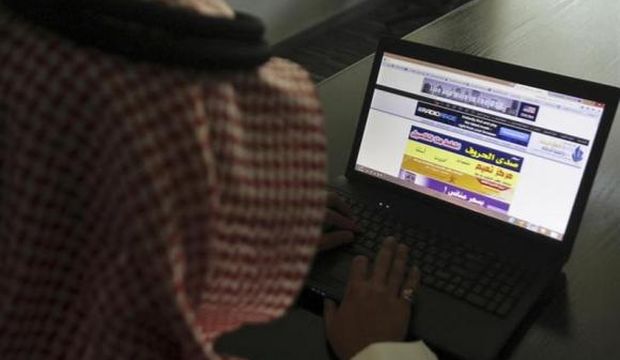
A Saudi man explores a website on his laptop in Riyadh in this file photo taken on February 11, 2014. (Reuters/Faisal Al-Nasser)
Dammam, Asharq Al-Awsat—A number of Saudi ministries and official bodies are cooperating to produce new legislation to regulate e-commerce activities in the Kingdom, following a growth in online fraud and money laundering.
An official within the Ministry of Commerce and Industry, who spoke on condition of anonymity, told Asharq Al-Awsat the Ministry was making “serious moves” in this direction and that there was currently ongoing coordination between the Ministry and a number of other official bodies in the Kingdom to integrate activities across the board.
Badr Abdul Karim, a member of the Commerce Committee at the Asharqia Chamber, told Asharq Al-Awsat that in addition to the Ministry, the Communications and Information Technology Commission and the Kingdom’s central bank, the Saudi Arabian Monetary Agency, would be playing central roles in creating the new regulatory environment.
Speaking to Asharq Al-Awsat, e-commerce specialist Mazen Al-Darab said traders and companies active online in the Kingdom were also involved in the process, and had already met with Minister of Commerce and Industry Tawfiq Al-Rabi’a.
He said he expected the whole process of creating a regulatory environment for online commercial activity in the Kingdom to take up to three years, with the draft legislation eventually being put forward before specialist committees and then the country’s top legal advisory body, the Shura Council, before being ratified by the government.
Commenting on the need for the legislation, Abdul Karim said: “It is of paramount importance to organize e-commerce activities, particularly since most of those involved in these businesses have limited incomes which they are seeking to boost through this kind of unregulated commercial activity.”
“There is also a large number of . . . women who have now entered this sector, whether through selling handmade items, accessories, or even food products,” he added. “So it is important that we organize and regulate this sector in order to preserve the commercial rights of those involved without at the same time contravening international laws regarding illegal activities.”
Darab believed the legislation was necessary in order to encourage online commercial activity to grow in the Kingdom. “There are those who have entered the e-commerce market [in the Kingdom] and have damaged its reputation through scams,” he said. “Certainly, this happens in any area [of business], but in the end it is the responsibility of the buyer to make sure they deal with trusted organizations. If it is necessary for the buyer to buy from unknown organizations, or from individuals, then it is important here that this is done on the condition that any monies are exchanged only when the buyer receives the goods and checks they are in proper condition.”
He added: “This kind of trading can be legal and, even before the legislation comes into place, whoever is active in it can ensure they are not prosecuted by the authorities if they obtain a commercial register from the Ministry of Commerce and Industry and open up a bank account in the name of the institution [they are using to trade online]. This will help enhance the credibility of [e-commerce in the Kingdom], since the funds [accrued] will be transferred to the [seller] institution’s bank account and the reason for the transfer will be declared. That way, the entire commercial process between the buyer and the seller is accounted for and the source of the funds known.”
Though he welcomed the moves to regulate the e-commerce environment in the Kingdom, Darab also stressed the importance of government bodies not interfering too much in such activities so as not to put a stranglehold on buyers and sellers, something he said could lead them to use the black market.
Darab added that other countries which have legislation and a regulatory framework for e-commerce do not see any official interference by any governmental bodies into buying and selling, only within an organizational capacity. He said that such a stance toward e-commerce would not only allow it to thrive in the Kingdom, but would also ensure that instances of online fraud and scams, as well as money laundering and any other illegal activities, are reduced.
